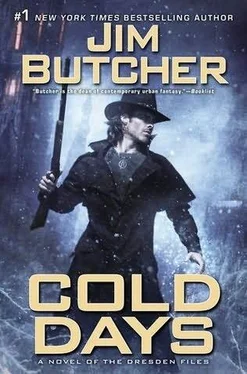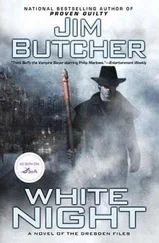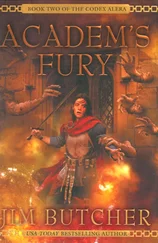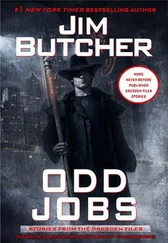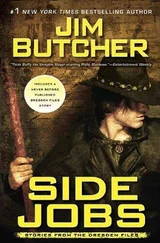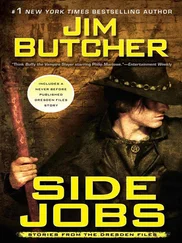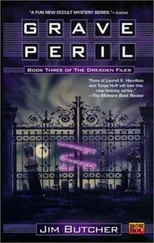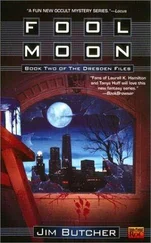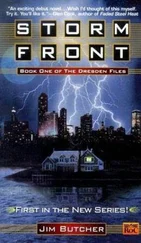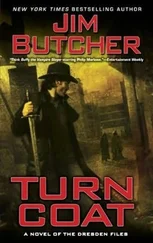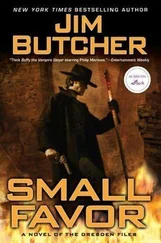“You can be so overly dramatic, betimes,” complained an old woman’s voice, as gentle and sweet as Mother Winter’s was unpleasant. She came into the house a moment later, a grandmotherly matron dressed in a simple dress with a green apron. Her long hair, silver-white and thinning, was done up in a small, neat bun. She moved with the slightly stiff, bustling energy of an active senior, and if her green eyes were framed by crow’s-feet, they were bright and sharp. Mother Summer carried a basket in one arm filled with cuttings from what must have been a late-season herb garden, and as I watched, she entered, muttered a word, and a dozen tiny whirlwinds cleaned thick layers of soot from the many-paned windows scattered around the cottage, flooding it with more warm light. “We’ll need a new cleaver now.”
Mother Winter, in her black shawl and hood, bared her iron teeth in a snarl, though it was a silent one. She pointed one crooked, warty finger at the window nearest her, and blackened it with soot again. Then she shuffled over to a chair beneath the window, and settled into the resulting shadow as if it were a comforting blanket. “I do what must be done.”
“With our cleaver,” Mother Summer said. “I suppose one of our knives wouldn’t have done just as well?”
Mother Winter bared her teeth again. “I wasn’t holding a knife.”
Mother Summer made a disapproving clucking sound and began unloading her basket onto a wooden table near the fireplace. “I told you,” she said calmly.
Mother Winter made a sour-sounding noise and pointed a finger. A large mug decorated with delicately painted flowers fell from a shelf.
Mother Summer calmly put out a hand, caught it, and returned it to the shelf.
“Oh, uh, Mother Summer,” I said, after a moment of silence. “I apologize for intruding into your home.”
“Oh, dear, that’s very sweet,” Mother Summer said. “But you owe me no apology. You were brought here entirely against your will, after all.” She paused for a beat and added, “Rudely.”
Mother Winter made another displeased sound.
I looked back and forth between them. Centuries of dysfunction in this family, Harry. Walk carefully. “I, uh. I think I’d prefer to think of it as a very firm invitation.”
“Hah,” said Mother Winter, from her hood. Her teeth gleamed. “The Knight knows his loyalties, at least.”
Mother Summer somehow managed to inject her voice with profound skepticism. “I’m sure he’s overjoyed to owe loyalty to you,” she said. “Why did you bring him here now, of all times?”
More teeth showed. “He summoned me, the precious thing.”
Mother Summer dropped her herbs. She turned her head toward me, her eyes wide. “Oh,” she said. “Oh, dear.”
Mother Winter’s rocker creaked, though it didn’t really seem to move. “He knew certain names. He was not wholly stupid in choosing them, or wholly wrong in using them.”
Mother Summer’s bright green eyes narrowed. “Did he . . . ?”
“No,” croaked Mother Winter. “Not that one. But he has seen the adversary, and learned one of its names.”
Calculation and thought flickered through those green eyes, faster than I could follow. “Ah, yes. I see,” Mother Summer said. “So many new futures unwinding.”
“Too many bright ones,” Mother Winter said sullenly.
“Even you must think better that than empty night.”
Mother Winter spit to one side.
It started eating a hole in the dirt floor a few inches from one of my feet. I’m not kidding. I took a small sidestep away, and tried not to breathe the fumes.
“I think,” Mother Winter said, “that he should be shown.”
Mother Summer narrowed her eyes. “Is he ready?”
“There is no time to coddle him,” she rasped. “He is a weapon. Let him be made stronger.”
“Or broken?” Mother Summer asked.
“Time, time!” Winter breathed. “He is not your weapon.”
“It is not your world,” Summer countered.
“Excuse me,” I said quietly.
Green eyes and black hood turned toward me.
“I don’t want to be rude, ma’am,” I said. I picked up the fallen wooden shelf from where I’d knocked it down, and put it back on its pegs. Then I bent and started putting the sealed jars back onto the shelf. “I’m still young. I make mistakes. But I’m not a child, and I’m not letting anyone but me choose which roads I’ll walk.”
That made Mother Winter cackle again. “Precious little duck,” she wheezed. “He means it.”
“Indeed,” Mother Summer said, but her tone was thoughtful as she watched me restore the fallen shelf to order.
I kept on replacing jars, lining them up neatly, and spoke as gently and politely as I knew how. “You can take my body and run it like a puppet. You can kill me. You can curse me and torture me and turn me into an animal.”
“Can,” said Mother Winter, “and might, if you maintain this impertinence.”
I swallowed and continued. “You can destroy me. But you can’t make me be anything but what I choose to be, ma’am. I don’t know exactly what you both are talking about showing me, ma’am. But you aren’t going to shove it down my throat or put it up on a shelf out of my reach, either one. I decide for myself, or I walk out the door.”
“Oh, will you?” said Mother Winter in a low, deadly whisper. Her overlong nails scraped at the wood on her chair’s arms. “Is that what you think, my lamb?”
Mother Summer arched an eyebrow and eyed Mother Winter. “You test his defiance against his very life, and yet when he passes you are surprised he does not leap to do your bidding?” She made another disapproving clucking sound. “He is brave. And he is courteous. I will show him what you ask—if he is willing.”
Winter bared her teeth and spit again, into the same hole, and more earth hissed and melted away. She started rocking back and forth, slowly, and turned her gaze elsewhere.
I picked up the last fallen pot and was about to put it away when I frowned. “Oh. I’m sorry, but there’s a crack in this one.”
I never heard or saw any movement, but suddenly Mother Summer was there beside me, and her bony, capable hands were wrapping warmly around mine. Her touch was like Lily’s but . . . gentler and more vast. It made me think of miles and miles of prairie soaking up the summer sun’s heat, storing it through the day, only to give it back to the air in the long hours of twilight.
As gently as if handling a newborn, she took the little clay pot from me and turned it slowly in her fingers, examining it. Then she exhaled slowly, closed her eyes for a moment, and then put it reverently back onto the shelf.
When she took her hands from the little pot, I saw letters written in silvery light upon it and upon neighboring pots, as if the letters had been awakened by the warmth of her hands.
The writing on the cracked pot said simply, Wormwood .
The letters began to fade, but I saw some of the others: Typhos. Pox. Atermors. Choleros. Malaros.
Typhus. Smallpox. The Black Death. Cholera. Malaria.
And Wormwood.
And there were lots of other jars on the shelf.
My hands started shaking a little.
“It is not yet the appointed time for that one to be born,” Mother Summer said quietly, and her hard eyes flicked toward Mother Winter.
She didn’t look back toward us, but her teeth gleamed from within her hood.
Mother Summer slipped her hand through my arm. I gave it to her more or less out of reflex, and walked across the cottage. She picked up her basket and then we went to the door. I opened it for her and offered her my arm again, and we walked together out of the cottage and into a modest clearing surrounded by ancient forest with trees the size of redwoods. They blazed with the colors of fall, their leaves carpeting the forest floor in glorious fire as far as the eye could see. It was gorgeous, but it wasn’t anywhere on Earth.
Читать дальше
